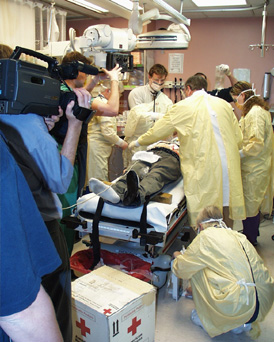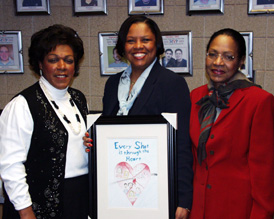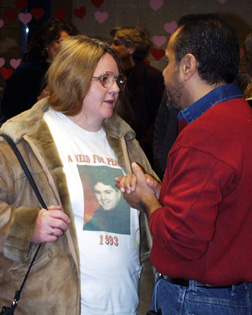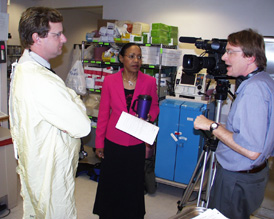 |
The camera rolls as emergency room trauma team goes into action. |
After countless planning meetings and eventually a grassroots campaign that raised $40,000 in production costs (from individual donations of $5 or $10 up to corporate gifts of $10,000) the film, titled, “Every Shot is through the Heart,” is now in production. From concept to production, UNMC/NHS has been instrumental in helping to guide and push the project forward. This assistance included a written summary of the project by Walter Brooks, media specialist, public affairs department; on-going project coordinating committee supervision by Aura Whitney-Jackson, UNMC liaison to South Omaha; consults with trauma team specialists from both NHS University Hospital and Creighton University Medical Center; consults with Omaha Police and Fire Department representatives and contributions from UNMC/NHS Community Partnership.
Children design image for video’s title
A major development in the project came through a contest among sixth grade students at Spring Lake Elementary School to create a graphic image of the video’s title. Paige Garcia’s winning design gave a distinct public image to video project. Later, framed poster-size copies of her drawing were presented to representatives of UNMC/NHS Community Partnership, Omaha Public Schools and the Omaha Police Department, for substantial support of the project. The UNMC/NHS poster was accepted by Valda Boyd Ford, director, UNMC/NHS Community and Multicultural Affairs.
 |
From left, Maria Valentin, community liaison for ConAgra, Inc., Valda Boyd Ford, and Aura Whitney-Jackson with framed copy of the video’s theme. |
“This video project is exactly the type of program encouraged by the mission of UNMC/NHS Community Partnership,” Ford said. “Aura Whitney-Jackson has developed an impressive network of community associations and plays a crucial role in the development of numerous programs and projects in South Omaha. The fulfillment of this video project will be one of her strongest achievements yet.”
In fact, in the past six months, Aura Whitney-Jackson has received two major community service awards for her work in South Omaha. But even she considers “Every Shot is through the Heart” to be a milestone project in community diversity and unity.
“The purpose of this video is much more than the standard approach of merely sharing information to raise awareness,” Whitney-Jackson said. “We will work with the city of Omaha and Omaha Public Schools, churches and youth organizations, public libraries, neighborhood associations, parenting groups and social service agencies all across the city. We will train the leaders of these groups to facilitate discussion groups and really seek to stem the tide of violence in Omaha.
“So many people made it a point to donate even few dollars. Their money was important to the overall goal, but more importantly was their desire to make sure we knew the community really wanted this project to succeed. So many people told us how sick and tired they are of street violence. They want to educate themselves on more effective ways to deal with issues of violence in their community.”
Gunshot trauma simulation
In a recent gunshot trauma simulation, Omaha Fire Department emergency medical technicians brought a young Latino male into the emergency room. A trauma team of doctors, nurses, radiologists and others did a high speed, but delicate and thorough examination and assessment of his blood-splattered stomach wound. The camera also recorded the faces of his family members – several of whom were in tears — as the trauma surgeon briefed them on the victim’s condition and what will be done in the operating room. Although simulated, the scenes were far more real than eventual viewers may ever know.
 |
Debbie Howard, mother of 1993 Omaha murder victim, Hank Thompson, with Alberto Gonzales. Howard’s story will be featured in the video. |
Four years ago, the simulated patient, Chris Gonzales, actually was on the emergency room table with a near fatal gunshot wound to the head. A self-admitted, former, South Omaha gang member, Gonzales today walks with great difficulty because of damage to areas of his brain that control motor skills. The tearful family members – courageous to even participate in a virtual reenactment of a loved one’s near death experience – hope viewers can feel their pain. Too many times the brief moment of news coverage leaves the impression that once the person leaves the hospital, or dies, the matter is closed in the community. The mission of the video is to help break this mindset and show how a bullet continues to resonate throughout the heart of the community.
“Chris Gonzales is my cousin and was a hardcore gang banger when he was shot,” said Alberto Gonzales, gang prevention outreach coordinator for South Omaha Boys and Girls Club, and the spiritual godfather of the video project. “He has since dedicated his life to the Lord and become a major speaker against violence. He has talked to groups of 10 kids and to audiences of more than 300. He was overwhelmed when I asked him to play the role of a gunshot victim for the video. He really wanted the video to be as real as possible.”
 |
Video photographer Doug Boyd, right, consults with Dr. Robert Muelleman and Aura Whitney Jackson before filming the simulated trauma response. |
According to Robert Muelleman, M.D., medical director of emergency medical services at UNMC/NHS, the NHS University and Creighton University Medical Center emergency rooms receive about 120 gunshot wounds a year. In Omaha, while car accidents are the leading cause of injury for youth under 18, gunshots are the leading cause of death. Although a gunshot wound can be a minor injury to a leg or arm, it can just as easily lead to long-term intensive care recovery or death. In addition, the cost of treatment and recovery for serious wounds can reach into the hundreds of thousands of dollars per patient.
“The bottom line is that gun violence is a public problem – but a problem that is preventable,” Dr. Muelleman said. “We can teach our young people that there are other sources of conflict resolution. My hope is that the public will respond to ‘Every Shot is through the Heart” and see this issue as both a predictable and preventable public health problem that we can all work together on to stop.”